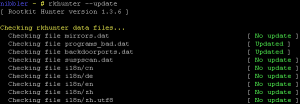Some of my servers providing FTP service and I check every weekend all the uploaded and system files for viruses and rootkits.
If somebody starts a upload, nobody think about potential danger e.g. virus.
You can start all this checks separated or as a script.
Here are some examples:
Installing rkhunter:
1 | aptitude install rkhunter |
Before you start a check, be sure your database is up to date.
1 | rkhunter --update |

After update you can start a full check:
1 | rkhunter --checkall --sk |
Installing clamav:
1 | aptitude install clamav |
The same thing, before you start to scan please update your database:
1 | freshclam |
Update Procedure:
1 2 3 4 | ClamAV update process started at Sun Jun 5 20:41:32 2011 main.cvd is up to date (version: 53, sigs: 846214, f-level: 53, builder: sven) daily.cvd is up to date (version: 13148, sigs: 125934, f-level: 60, builder: guitar) bytecode.cvd is up to date (version: 143, sigs: 40, f-level: 60, builder: edwin) |
Create a quarantine directory for infected files:
1 | mkdir /var/tmp/quarantine |
Start a scan:
1 | clamscan -r --move=/var/tmp/quarantine/ /var/www |
Weekend cron script:
1 2 3 4 5 6 7 8 9 10 11 12 13 14 15 16 17 18 19 20 21 22 23 24 25 26 27 28 29 30 31 32 | #!/bin/sh # <kiwi@zeldor.biz> # Sun Jun 5 21:22:56 CEST 2011 # Report recipient RECIPIENT="reports@gadget.zeldor.biz" QUARANTINE="/var/tmp/quarantine/" LOG="/tmp/weekly_scan.log" rm -f $LOG # Update rkhunter-DB rkhunter --update --nocolors &>$LOG # Update Clamav-DB freshclam --quiet &>>$LOG # Start rkhunter scan rkhunter --checkall --nocolors --sk &>>$LOG # Start Clamav scan clamscan -r -i --move=$QUARANTINE /var/www &>>$LOG echo "----------- SCAN SUMMARY -----------" &>>$LOG if [ "$(ls -A $QUARANTINE)" ]; then echo "Take action, quarantine is not empty!" &>>$LOG else echo "Quarantine directory is empty" &>>$LOG fi echo "Please look at the attachment for more details" | mutt -s "Weekly check report, $(date +'Week %V')" -a $LOG -- $RECIPIENT </kiwi@zeldor.biz> |


Thanks for the tips!
You’re using ‘&>’ as redirection, but this is a bashism. Therefore you should use ‘/bin/bash’ within the shebang (/bin/sh could link to bash,dash,ksh…).
And instead of writing ‘&>>$LOG’ at every line you may write ‘exec >$LOG’ at line 9.
Regards,
Enrico